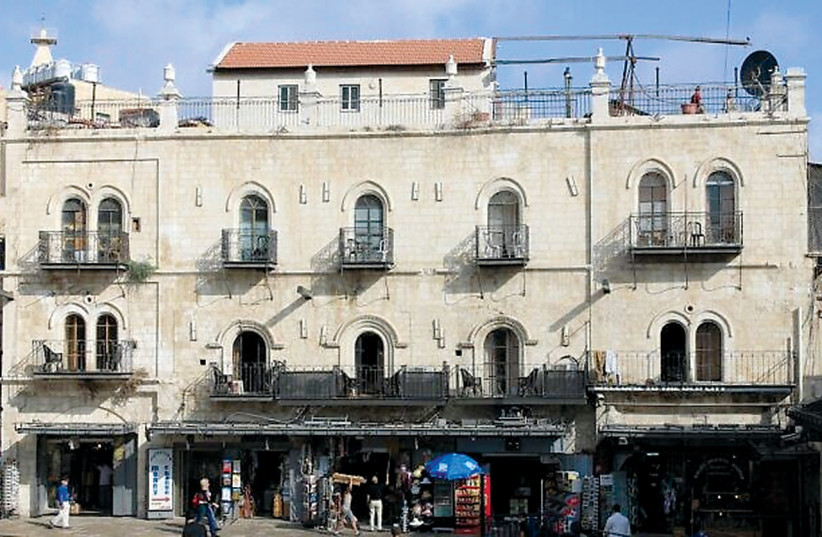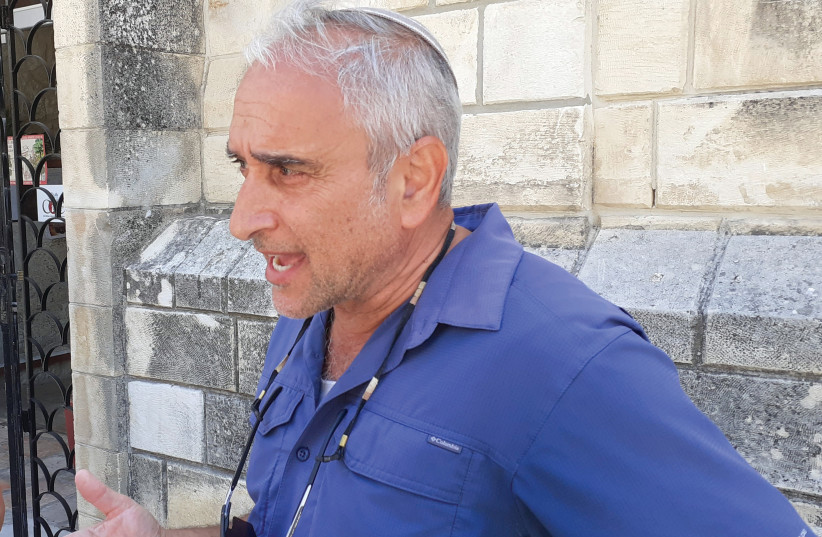After Supreme Court upholds transfer of 98-year leases for two historic inns in Jerusalem’s Christian Quarter, hoteliers face eviction
By GIL ZOHARPublished: JULY 2, 2022 01:48

While the religious quarrel between Jews and Muslims in Israel has been going on for a century and a quarter, the dispute is also a multifaceted real estate conflict. Witness the 18-year legal wrangle over the validity of the contract by which the Greek Orthodox Patriarchate of Jerusalem leased two church-owned landmark hotels in the city’s Christian Quarter to an Israeli right-wing NGO for 98 years, with an option to renew for a similar period.
With the Supreme Court’s ruling on June 8 upholding the Jerusalem District Court’s recognition of that lease agreement to the Ateret Cohanim, the conflict has now moved into its final phase whereby the Jewish group may proceed through the courts to evict the Palestinian Arabs who are the Imperial Hotel and the Petra Hotel’s protected tenants.
While Ateret Cohanim legally purchases Arab-owned property in east Jerusalem, those sales are typically hidden behind straw men and offshore companies. Palestinians caught selling land to Jews, often at inflated prices, are routinely tortured and executed as traitors.
A scandalous sale
But in the case of the two historic hotels, both just inside the walled medieval city’s Jaffa Gate, the two properties were sold for a pittance – $1.25m – significantly lower than their market value. In a scandal that rocked the Greek Orthodox Patriarchate, then patriarch Irenaios denied knowledge of the sale at the time and claimed it was void, then backtracked and said it was the work of the church’s director of finance, Nicholas Papadimas, who carried out the shady transaction without the church’s authorization and allegedly was bribed by Ateret Cohanim to promote the deal.
In 2005, when Israel’s lively media broke the story of the sale, Irenaios was forced from office by Greek Orthodox officials. He was replaced by the current patriarch, Theophilos III, who rejected the hotel lease sales and took the case to the Jerusalem District Court. That body ruled Irenaios was authorized to sign the contract, leading to the Supreme Court appeal.

DANIEL LURIA, executive director, Ateret Cohanim. (credit: GIL ZOHAR)
The Greek Orthodox Patriarchate had requested the retrial based on an affidavit of Ted Bloomfield, who worked for Ateret Cohanim in the 1990s. Bloomfield claimed the NGO routinely bribed senior church officials and on occasion provided them with prostitutes, according to Haaretz.
The Supreme Court ruling has angered Russia and led to diplomatic pressure on Israel. Before World War I broke out in 1914, Czarist Russia was the protector of Palestine’s Eastern Orthodox Christians, while France defended the Ottoman Empire’s Roman Catholics. However, Russian President Vladimir Putin’s influence has diminished since Russia invaded neighboring Ukraine on February 24.
ISRAELIS TYPICALLY “own” their real estate property through long-term and renewable leases from the Israel Lands Authority or the Jewish National Fund. A third major landholder is the cash-strapped Greek Orthodox Church. The church began issuing lengthy leases on land in Jerusalem in the 1920s, when the Soviet Union stopped funding the patriarchate and halted heavily subsidized pilgrimages of Russian peasants to the Holy Land.
Abu Walid Dajani, 80, whose business card identifies him as the “owner” of the 1,800 sq.m. Imperial Hotel, told a press conference recently that he has operated the boutique hotel since 1949 shortly after his clan fled their 14 homes in the German Colony on the west side of the city during the War of Independence.
Dajani, who is Muslim, warned that if yeshiva students were allowed to occupy the hotel’s 44 rooms, they would likely pelt the weekly procession of the Latin Patriarch to the Church of the Holy Sepulcher with tomatoes and rotten eggs.
He called for an international committee to prevent Ateret Cohanim from taking over the building. While a July 2020 statement signed by 13 leaders of various Christian denominations in Jerusalem condemned the sale, the appeal was powerless to affect the legal proceedings.
Dajani noted that on June 9, .
Standing in front of the Petra Hotel, Daniel Luria, the Australian-born executive director of Ateret Cohenim, measured his words saying: “No one is being kicked out.” He said plans call for restoring the two buildings as boutique hotels rather than as rabbinical seminaries.
Adding complexity to the conflict, the Petra Hotel was built in 1841 by Joseph Amzalaq, a Jewish merchant from Gibraltar. At the time, Jerusalem’s Old City was heterogeneous, and faith communities lived side-by-side. Besides offering rooms for rent, the kosher complex was home to his extended clan, a synagogue and yeshiva, and various shops. Amzalaq died in 1845, and the hotel repeatedly changed management. One of the owners was the Amdursky family from Amdur near Moghiliev in Belarus-Ukraine, who took possession in 1898.
Following the earthquake of 1927 and the riots of 1929, the Amdurskys sold their Central Hotel to the Greek Orthodox Patriarchate and relocated their business to Ben-Yehuda Street in the new city. That hotel was blown up in a terrorist bombing in February 1948, as Mandate Palestine slipped into chaos and civil war.
“I smell antisemitism and racism trying to enforce Judenrein areas in united Jerusalem,” said Luria.
“Jews are the indigenous people in Israel,” he added, and other claims are “unacceptable.” ❖
Content retrieved from: https://www.jpost.com/business-and-innovation/real-estate/article-710903.
